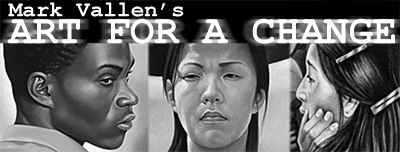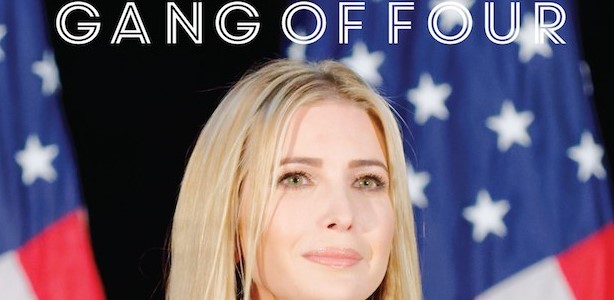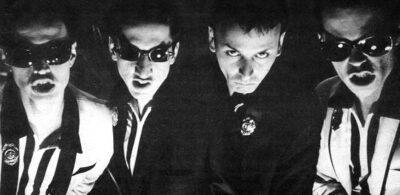Gang of Four—They Fail Us Now
This essay is a contradictory tale of brilliance and entropy, inspiration and disillusionment. It is a story about a once dazzling rock band I discovered in 1978, a group I formerly thought to be indispensable. My commentary refers to the punk, funk, political, rhythm machine from the UK known as Gang of Four.
Politically speaking, what I loved most about the band was this, their onslaughts were aimed at institutions and systemic failures, never individuals.
During the 70’s and 80’s there was an endless cast of real life brutes and reprobate politicos to be identified, but the band never spoke their names. Instead they targeted the debased social situations we accepted, the ruin we internalized and embraced, and our gullibility as we traversed boundless media landscapes of deception and manipulation. The poetry of their words and rhythms were an attempt to crack open ideological facades; what more can an artist do?
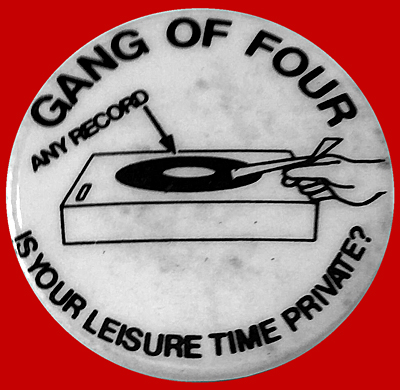
Given the abysmal state of public discourse today, their laudable stance of long ago was really extraordinary, and paralleled my own belief that ideas should be fought rather than people. Yet, the newfangled Gang of Four in 2018 have abandoned their former attitude, and have now disparaged by name a famous American individual using graphics and a musical cudgel. However, before Quietus sacks the Gang of Four, please first allow me to praise the past glories of the British rockers.
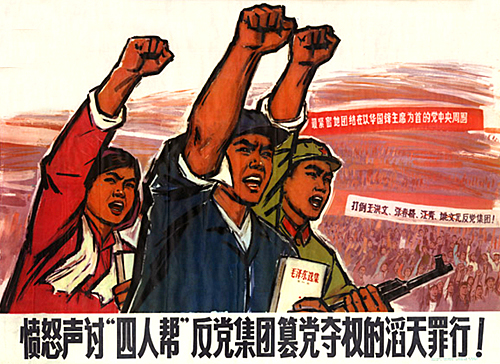
I couldn’t help but notice the death of Chairman Mao on Sept. 9, 1976; he died just two days after my 22nd birthday. Mao’s demise threw China into turmoil. The Chinese Communist Party was split between “moderates” who wanted to develop the economy and radicals who wanted to further Mao’s revolution.
The leader of the radicals was Mao’s wife, Jiang Qing. In October of 1976 the moderates staged a bloodless coup, arresting Qing and three other party members. Dubbed the “Gang of Four” they were tried and convicted of anti-party activities, receiving life imprisonment or lengthy prison sentences.
Along comes 1977 and four young men in Leeds, England needed a name for the band they just formed. “Despairing Working Class Blokes” might have sufficed but instead they choose Gang of Four. It was unquestionably the perfect name for a coterie of young proles determined to make left-wing political music you could dance to. I was immediately won over by the group’s jagged, distorted sound, and their subversive lyrics that undermined conceptions of leisure activity, mass media, and the limits and excesses of political power.
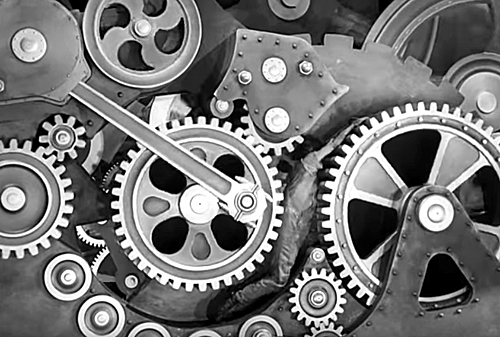
I can metaphorically describe their sound. It was the imagined noise of the leviathan Factory Machine from Charlie Chaplin’s 1936 silent film Modern Times. That hellish engine drove Chaplin insane with its repetitive cadence; it swallowed him whole and crushed him in its tremendous cogs. The grinding, pulverizing, hammering cacophony of such a dynamo found its equivalency in the steamroller drumming and frangible guitar playing of Gang of Four.
When performing, the four never cracked a smile. Singer Jon King ran about the stage in a state of confusion, stopping only for panicky, exaggerated bouts of spastic dancing. Guitarist Andy Gill blankly stared at the audience while furiously strumming at his guitar, only to pluck a string one out of ten times. Dave Allen turned his bass guitar into a jackhammer, while drummer Hugo Burnham pummeled and clobbered everyone into line with the most disciplined, precision drumming I have ever heard in rock music.
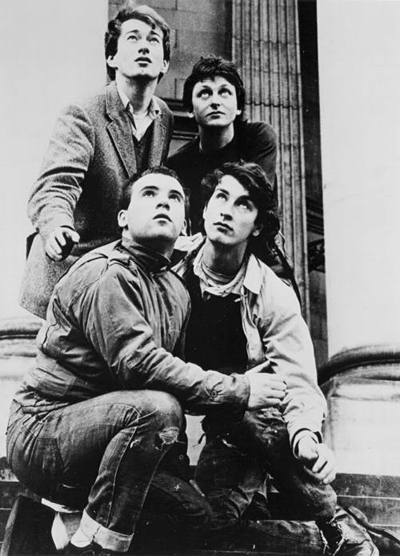
Above all else where the lyrics. Fashioned from imbecilic news headlines, advertising jingles, and bourgeois moral codes, they were Situationist barbs that caused the listener to question the nature of… well, everything about hyper-consumerist society. From the commodification of sex, to favored opinions and even alienation being the result of systemic conditioning.
This may sound frightfully boring except that Gang of Four were not a faction of glassy-eyed Leninists browbeating you with Marxist jargon, they were a dance band—not a funky dance band, but a dance band in a funk. And while they cheerlessly delivered their woebegone, crestfallen messages, their austere but infectious beats made you tap your feet and move your body.
In 1977 I was already deeply involved in the Los Angeles punk scene when I read about the Gang of Four in the English music press. I promptly bought the band’s debut single when it was released in October, 1978. The 7” vinyl record presented three difficult songs that would forewarn of the Gang’s future output; Damaged Goods, Armalite Rifle, and Love Like Anthrax. In fact two of those songs appeared on the band’s premiere 1979 album, ironically titled Entertainment!
The title song Damaged Goods had a double meaning, the obvious one a story of failed romance, but the innuendo was how to extricate oneself from a fruitless political situation. “Damaged goods, send them back. I can’t work, I can’t achieve, send me back. Open the till, give me the change you said would do me good. Refund the cost, you said you’re cheap but you’re too much!”
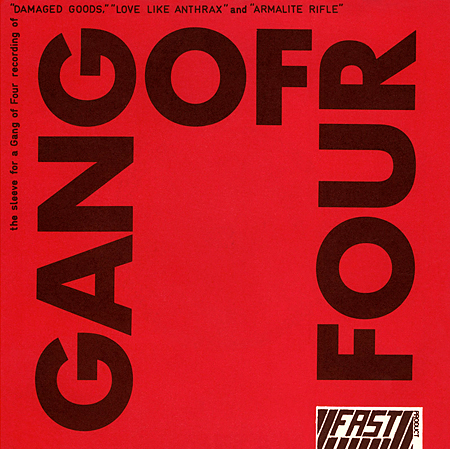
Armalite Rifle was about the armed conflict between the Irish Republican Army and the British Crown in the 1970s. Specifically the song focuses on the Armalite AR-18, a select-fire rifle that was used by the British police and the IRA. “Armalite rifle, police and IRA. Armalite rifle, use it everyday. A child could carry it, do it no harm. Armalite rifle… and the holy Trinity, used against you… like Irish jokes on the BBC.” The jab at the British Broadcasting Corporation was one of many cutting remarks the band leveled at media over the years. As one might imagine, the song Armalite Rifle had a driving martial quality to it. One could say the song was pacifistic. You might well think that. I couldn’t possibly comment.
Love Like Anthrax was an anti-love song I used to play when I wanted to frighten my hippie friends. A whirlpool of churning feedback and caustic lyrics, most everyone I played it to in 1978 would wrinkle their nose in disapproval. “And I feel like a beetle on its back. And there’s no way for me to get up. Love will get you like a case of anthrax. And that’s something I don’t want to catch.” As singer Jon King intoned the dour ode, guitarist Andy Gill recited a deadpan monologue on the ubiquity of love songs in pop music. “I don’t think we’re saying there’s anything wrong with love, we just don’t think that what goes on between two people should be shrouded with mystery.”
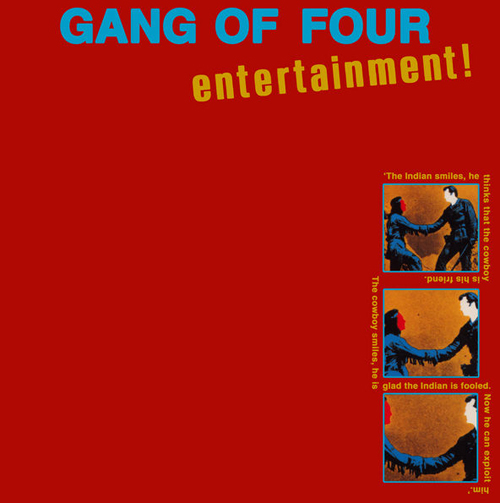
In the summer of 1979 I saw the Gang of Four perform at the world famous Whiskey A Go-Go on the Sunset Strip. That may sound romantic, but it wasn’t. Yeah, it was a real warm welcome from the people of Los Angeles; there were only 50 slack-jawed people in the dark shabby club watching the amazing performance. The boys blazed through At Home He’s a Tourist, Armalite Rifle, and the rest of the songs from their just released Entertainment! album, but when a sweaty Hugo Burnham stepped out from behind his drum set to sing the feminist descant It’s Her Factory, the world stopped.
“Item: Daily press, views to suppress. Subject: Story on the front page… suffering from suffrage. Title: Unsung heroine of Britain, position to attain, housewife heroine, addicts to their homes. It’s her factory, it’s a duty.” Dave Allen’s bass line penetrated the thickest of skulls, Jon King’s stark melodica playing gave an etherial bent to the dirge. “Paternalist, journalist… he gives them, sympathy… because they’re not men, scrubbing floors they’re close to the earth, in a man’s world, they’re not men, in a man’s world, because they’re not men.” In the background King wailed, “It’s a factory!”
I was thunderstruck… most of us were; the song ended abruptly with the words, “A little, of a lot, keeps them happy. Avoid the answers, but keep them snappy. That’s all.” While the crowd was inordinately small, that didn’t vex the band, who gave a momentous performance.
I should note that in 1979 the BBC’s music television program Top of the Pops, censored At Home He’s a Tourist for being too risqué. “Down on the disco floor, they make their profit, from the things they sell, to help you cob off, and the rubbers you hide, in your top left pocket.” The BBC wanted the word “rubbers” replaced with the word “rubbish.” The band refused to sing a censored version of their song and so walked out of the performance.
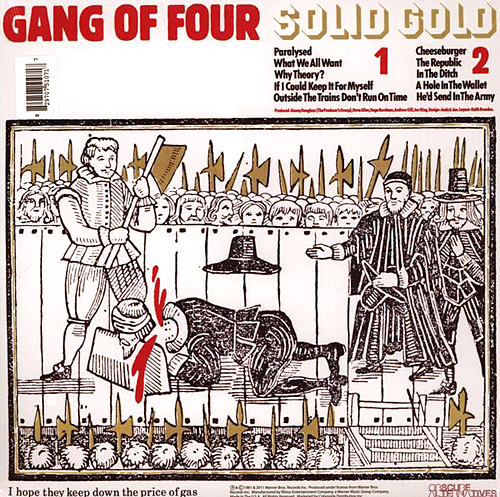
Fast forward to 1981 when Gang of Four released their mirthfully titled second album, Solid Gold, an arresting collection of danceable diatribes. All the songs were imposing, but Paralysed stood out for its disconsolate air and plodding lilt. “Blinkered, paralysed, flat on my back. They say our world is built with endeavor, that every man is for himself, wealth is for the one that wants it, paradise, if you can earn it. History is the reason… I’m washed up.” The song dies, then starts again. “My ambitions come to nothing, what I wanted now just seems a waste of time. I can’t make out what has gone wrong. I was good at what I did. The crows come home to roost, and I’m the dupe.”
That same year the group released the single, To Hell With Poverty!, a song with the energy of an out of control train about to run off the tracks; the compelling lyrics contain a double meaning from the boys. “In my arms, we shall begin, we’re not on the rocks, well there’s no charge. In this land, right now, some are insane… and they’re in charge. To hell with poverty, we’ll get drunk on cheap wine. To hell with poverty. The cheque arrives, it’s in the post again. To hell with poverty. The cheque arrives, it’s in the post again.”
Meaning? The worker declares his resistance, takes his pay, and squanders it on cheap plonk, all the while believing he’s rebelling. This parable of a song got me through rough times in the early 1980s and it continues to resonate. It’s especially applicable for today’s booshwa rebels à la mode.
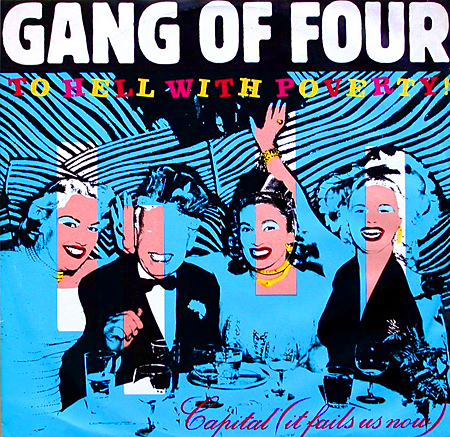
The flip side to To Hell With Poverty! was the song Capital, It Fails Us Now. I will never forget playing it for a friend of mine, who at the time was the news director of an independent radio station in Los Angeles.
He didn’t think much of punk music; as a jazz aficionado he endlessly regaled me with stories on the majesty of Charles Mingus, Sun Ra, Art Ensemble of Chicago and the like.
My pal knew jazz, a form I fell in love with as a 15-year-old when I first heard John Coltrane play My Favorite Things. But my amigo did listen attentively to the Gang of Four song; he pricked up his ears at the deadpan vocals delivered by Jon King: “The moment I was born, I opened my eyes. I reached out, for my credit card. Oh no, I left it in my other suit! Capital, it fails us now. Comrade let us seize the time. On the first day of my life, I opened my eyes. Guess where, the superstore. Surrounded by luxury goods, I need a freezer, I need a hi-fi. No credit, no goods. Call my bank, I said. They say we’re bankrupt.”
When the song ended my colleague turned to me and said exuberantly, “Vallen, that song is a Marxist critique of society!” Since I loved to playfully rib my friend I befuddled him with: “No, you’re wrong. The band is saying that Capital, the treatise on communism written by Karl Marx, has failed us!” Given the dark sarcasm of the Gang of Four, whose to say my “alternative facts” were wrong?
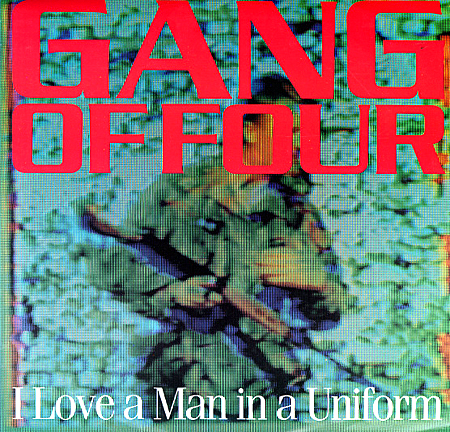
In 1981 Gang of Four released their song I Love A Man In A Uniform. The next year it was released in the United States. The song took on alienation, sexism, and militarism in one fell swoop: “The good life was so elusive. Handouts, they got me down. I had to regain my self-respect, so I got into camouflage. The girls they love to see you shoot. I love a man in a uniform. I love a man in a uniform.”
In 1982 the BBC banned the song from the airwaves, saying it was inappropriate to broadcast when Britain’s armed forces were fighting Argentina in the Falkland Islands war. In the U.S. the song received considerable radio airplay, even from stations that never played punk music. The song was more upbeat than most Gang of Four numbers, but something about it was amiss. I was perplexed by the public’s reaction; the song was thought to be a sexy dance party song—and a pro-military one at that. Yobs especially fixed on the line The girls they love to see you shoot. I always thought the Gang of Four erred in the making of this song, artists doing political works must always strive for absolute clarity.
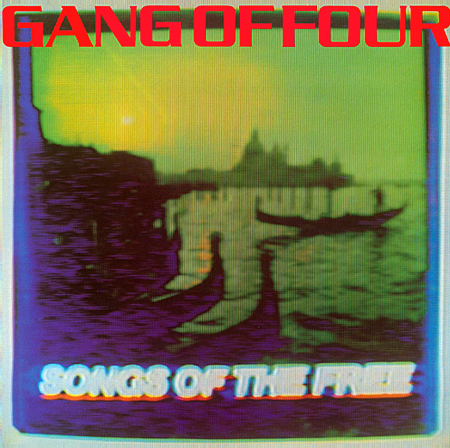
In September 1982 I saw the Gang of Four in concert at the Country Club in Reseda, California. It was part of the band’s “Songs of the Free” tour in the U.S. to promote the album of the same name.
The group nearly filled the 1,000 person venue in sunny Southern Cal. Naturally, the evening’s fare would come from the Songs Of The Free album. Call Me Up was served with an extra helping of scornful derision; the irony was so thick you could cut it with a knife: “Children of the pleasure culture, who must be grateful for what we’ve got. Happy smiles in sunny climes. So don’t upset the ice-cream cart. Having fun is my reason for living. Give me a break!”
I had the feeling the songs from that night were written just for us mutant Angelenos packed into that nowheresville club. Life, It’s A Shame said it all: “Talk of corruption is to preach insurrection. Elected to power men suspend self-interest. You and I, we are satellites, it’s a shame. You and I, we are satellites, it’s a shame. Life! Making money is making sense. Making money is making sense. It’s a shame.” Some of us will always remember that concert, it was matchless, the perfect encapsulation of where society stood at the end of the 20th century.
The Country Club, now forgotten, began as a venue for country western music in 1980. However, the owner soon started to book punk bands and the place garnered a reputation as an alternative performance space. During this period I saw the Jamaican dub poet and musician, Mutabaruka; he scorched the place with his fiery political reggae music. But all good things must come to an end; in the late 1990s the Country Club shuttered its doors for good. Reflecting the colossal shift in demographics taking place all over Southern California, the space reopened as a Spanish language Church for newly arrived Latinos.
I must point out that it’s almost useless to look up Gang of Four lyrics online. Popular lyric archives have mangled the group’s lyrics to the extent that one begins to think it’s a conspiracy of some kind. Found everywhere on the internet, including on Youtube, these wildly inaccurate transcriptions radically gut the meaning of the quartet’s songs. A case in point would be the lyrics of the song, Outside The Trains Don’t Run On Time, which addresses authoritarianism.
“He’s become nostalgic, wants to own tomorrow. Discipline, is his passion. Now, he says there’s none. Outside the trains don’t run on time. He believes it’s no coincidence. He thinks some blood will drag him down. Home, it’s no castle. He wants his wife to run, and fetch. Order, he’s obsessed with order, order.” The incorrect lyrics found all over the internet read: “Keeping up nostalgic, want to own tomorrow. Discipline, is his passion. Now, is enough. Outside the trains don’t run on time. He believes it’s not coincidence. He thinks the blood will run them down. Hold, it’s no castle. It’s once it’s white to run and fetch. Order his obsession, order, order.”
The original song lyric was stripped of its pro-Woman message. The only reliable transcriptions of the group’s lyrics are found printed on the record sleeves of the original vinyl records. Ah, the digital age! And you don’t believe in “fake news”?
Bassist Dave Allen left in 1981, beginning the never ending “musical chairs” of new band members. Drummer Hugo Burnham and lead singer songwriter Jon King left in 1983. I lost interest in the group and totally ignored their sans Allen/Burnham disco sounding fifth album, Hard, save for the ever so slightly redemptive Woman Town. American music journalist Robert Christgau wasted no words, “This record is damn near dead on its feet.”
For me the band’s tenuous last hurrah was their fifth studio album, the 1991 Mall; it was released as President George Herbert Walker Bush unleashed Operation Desert Shield on Iraq that same year. With songs like World Falls Apart, Cadillac, and FMUSA, the band attempted to mix memories of the Vietnam war with missives about the growing conflagration in Iraq. Not being a fancier of saccharine love songs, I found the decidedly non-sugar-coated and ethereal Satellite the most memorable song in the collection. While I leaned towards liking the album, it didn’t hold me spellbound like the band’s previous offerings. After Mall my love affair with the group was on hold.
Many lifetimes later, I heard that guitarist Andy Gill—the last remaining original member of the group, had become the “frontman” for a reconstituted Gang of Four, and that the band had released an album titled What Happens Next.
The new Gang of Four were a little too reconstituted for me, they had become a simulacrum. In fact, What Happens Next was a mud pool of computerized synth doodles enveloping humdrum vocals and lyrics. Despite being mud, when thrown, it would stick to nothing. If Gill had released this recording under his own name that would have been one thing, but he messed around with the legacy of Gang of Four, and that’s quite another matter.
Imagine for a moment that the psychedelic rock band The Doors, in the wake of Jim Morrison’s death, continued to tour and record new albums, and then… oh wait, that actually happened.
After Morrison’s death, band members Ray Manzarek and Robby Krieger wanted to tour and record under the Doors name—they also wanted to sell the rights to Doors songs for use in advertising. But drummer John Densmore, understanding Morrison to be the irreplaceable heart and soul of the Doors, fought and won a lengthy court battle preventing use of the name “The Doors.”
As the last original member of the Gang of Four, there’s a lesson for Andy Gill waiting in the “strange days” of The Doors… you too are replaceable, and in a time to come there may very well be a Gang of Four with no original members. Nevertheless, not even the improprieties of Gil can torpedo the legacy of those early works by the real Gang of Four.
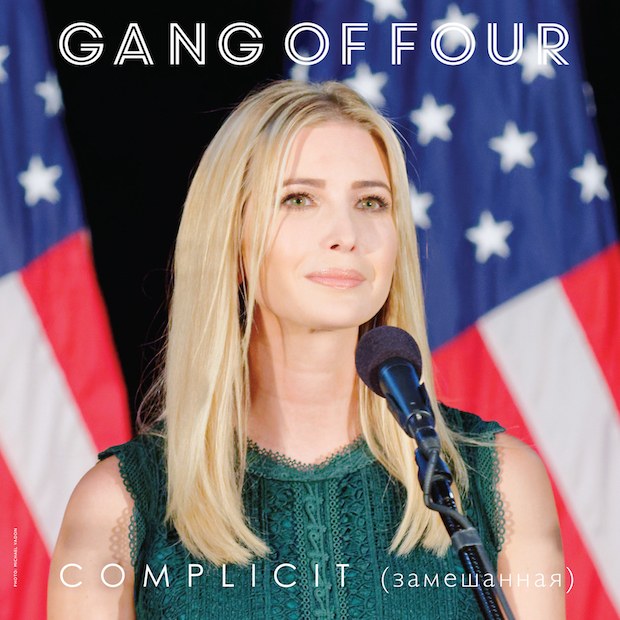
Which brings me to the Washington Post, you know, where “Democracy Dies in Darkness.” On April 5, 2018 they published an article titled, “Ivanka Trump is featured on the cover of a punk band’s new ‘Complicit’ album.“ Now guess who that unspecified “punk” band might be. Yup, its Andy Gill’s ersatz Gang of Four, otherwise known as the Gang of One. It’s illuminating that the Washington Post has written so little on the original Gang of Four over the decades. A puny concert review they published in 1979 was not only indicative of mainstream press coverage of the band, it was hilarious in its cluelessness:
“The Gang of Four, the London band that opened the show, had one leaden foot stuck in the punk tradition and the other dangling in concept art. The band tried to fuse disparate musical elements—ominous and militia-like, drums, dissonant and choppy fragments, and toneless chanted vocals—into something new and compelling. At their best, in “At Home He’s a Tourist,” they were riveting. At their worst, they sounded like a Metroliner derailing in Union Station. Mostly they were perplexing.”
Perplexing eh? Ah! But now the Washington Post just loves the Gang of Four, because… you know, the racist, sexist, homophobic, transphobic, Islamaphobic, orange Cheeto nightmare, warmongering Nazi dotard Trump!
Andy Gill made a curious statement to Pitchfork.com regarding Ivanka (Things You Can’t Have), which is of course the second track on the Complicit EP. It was an atypical comment from Gill about the media:
“When we think of ‘the media’ everyone has lots of ideas about what we mean. It could be social media, where hundreds of memes crisscross the world; informing, misinforming, beginning or reinforcing ideas that may last a lifetime and beyond. Ideas about Jews, Muslims, or, say, the World Trade Center or perhaps, the criminality of certain American politicians. And then there is the receding traditional media with disappearing jobs like ‘journalists’ and ‘fact checkers.’ That’s the media the Trump family despise.”
Gill’s comment can only be read as a frontal attack on President Trump, as well as a full-throated defense of traditional media. That will surely thrill Trump’s detractors (which is obviously the point), but Gill’s remark is inconsistent. The Gang of Four have a history of lyrically zeroing in on the ways media have created unhealthy social-political landscapes, and otherwise adversely bending and shaping public consciousness.
When I saw the Gang of Four at the Country Club in 1983, fifty corporations owned 90% of all media in the United States. By 1993 that number had fallen to twenty. Today, as the Gang of Four inflicts Complicit upon the world, there are only six corporations in control of America’s media. That means just six companies hold sway over 90% of newspapers, magazines, radio, television, movies, and music in the U.S., including distribution outlets. Put another way, a tiny minority has a stranglehold over the news and culture consumed by Americans, but Andy Gill wants you to worry about Trump hating the media.
Gill’s mention of the “journalists” and “fact checkers” of the “traditional media” is a laugh. Is he speaking of how the “newspaper of record,” the New York Times, helped take America—and the world—to war in Iraq in 2003? The paper published repeated headlines and reports about Saddam Hussein possessing weapons of mass destruction and having connections to al-Qaeda. It was all based upon lies and fabrications provided to NYT reporter Judith Miller by Iraqi Ahmed Chalabi, who was heavily funded by the CIA and the US government. So Gill, your “traditional media” was nothing but a mouthpiece for the war mongers. And the “fact checkers,” well… they were simply on an endless vacation.
Or maybe Gill was talking about the traditional media in 2011, when President Obama decided to overthrow Muammar Gaddafi by bombing Libya. The Prez said he didn’t need Congressional approval, because it wasn’t a war, it was a “kinetic military action.” He said the War Powers Act didn’t apply. But the war effort required Cheerleaders, so the traditional media with its journalists and fact checkers stepped in to convince everyone a democratic uprising was underway. The democratic “rebels” turned out to be mostly Islamic fanatics, and after they murdered Gaddafi Libya didn’t become a Jeffersonian Republic, it became a bug light for al-Qaeda and ISIS. The “fact checkers”? They’re duteously counting the Libyan refugees flooding into Europe.
Over the years the Gang of Four cultivated a reputation as radical provocateurs, conceivably for the theatrics of it. Finding an article about the band that doesn’t refer to their “Marxist” “Socialist” or “left-wing” leanings is not an easy task. But at this point, their Complicit publicity stunt points in another direction. In their present Gang of Four 2.0 form they have become political opportunists. Don’t be surprised if you see Andy Gill wearing an “I’m With Her” T-shirt.
In 1988 Noam Chomsky wrote a book tilted Manufacturing Consent. He argued that mainstream media proved to be “effective & powerful ideological institutions that carry out a system-supportive propaganda function.” Wow, that sounds like a Gang of Four lyric! For years leftists accused “corporate media” of being a threat to democracy by actively “manufacturing consent” with broadcasts and articles. In the late 1980s the American left referred to journalists as “stenographers to power.” Left-wing journalist David Barsamian used that phrase to title his 1992 book on “media and propaganda.”
Of course all of this ceased when Mr. Trump invented his own variant of the terms “manufacturing consent” and “stenographers to power.” Vulgarian that he is, Trump just calls it “Fake News.” Now the left is backpedaling, no more criticizing the propaganda functions of the corporate media, no, it’s time to take your place on the barricades because “Trump is deliberately undermining the First Amendment!” You’re liable to find Andy Gill atop one of those barricades, and if you’re nice he might sell you a copy of Complicit.
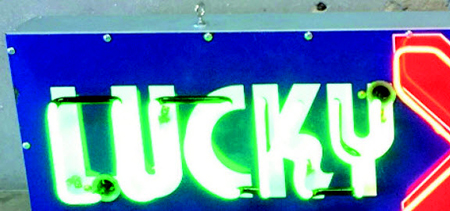
Even the rebooted Gang of Four are peddling bargain-basement Russophobia these days; the cover art for Complicit displays the Russian translation of the title in parentheses (замешанная). The EP contains four songs, Lucky, Ivanka (Things You Can’t Have), I’m a Liar, and Lucky (10 O’Clock Chemical Remix). I dared a listen to Lucky, released in advance as a slick marketing trick, except, cleverness has nothing to do with it if what you’re selling is subpar. Forgive me but, to the ears of this once hard-core Gang of Four fan, Lucky is unlistenable.
SPIN had an April 4, 2018 review of the Gang’s new effort that is likely the only honest critique you’ll find on the internet. It reads in part:
“Unfortunately, Lucky, the first single, is really not very good at all. With some squelchy bass, brittle fuzz-tone guitar, and a tepid vocal from whatever lead singer Andy Gill is working with these days, it sounds more like dance punk revival also-rans (and recent Gang of Four manifestation) the Faint than any of the Gang’s classic era material. But we’re posting it anyway, just because of that awesome cover art. I guess you could say we’re… Complicit.”
So there’s your standard of criticism when it comes to today’s music. SPIN could not have been more honest had they written: “The song is execrable but we’ll promote it despite our better judgement since it’s against Trump. Oh yes, and we’re Complicit.” True enough, scheming right along with the Washington Post, Newsweek, and the slippery mucky mucks of the DNC.
I have read comments from people who have never heard of Gang of Four, or from those who are marginally familiar with their music but don’t care for it. These types have said they will buy Complicit, not because they have been swept off their feet by the Gang of Four, but because they hate Trump. Congrats boys, I don’t think you’ve ever attracted such a following before. Funny, you used to critique commodification, but now apparently you fully embrace it.
Then there are those open-minded, supposed aficionados of Gang of Four, who insist Andy Gill’s Complicit is not a case of “jumping on the bandwagon to cash in on being anti-Trump.” They’ll also buy Complicit, pointing to Entertainment! and Solid Gold as proof that Andy Gill “has been consistent for over forty years,” as if all the fuss over the decades has been about Mr. Gill. Don’t ignore the fact that the band that created those albums exists in memory only.
It has been reported in certain quarters that Complicit will be released on April 20, 2018. Workers, remember, you can declare YOUR resistance by taking your pay and squandering it on cheap plonk! In the meantime, if you hear the words “Making money is making sense. It’s a shame” rattling around in your head, there may be hope for you yet.
____________________XXXX____________________
UPDATE: Andy Gill died on Feb. 1, 2020 at the age of 64. His death was listed as “multiple organ failure and pneumonia.” Gill’s wife Catherine Mayer believes he was an early victim of Covid-19.

